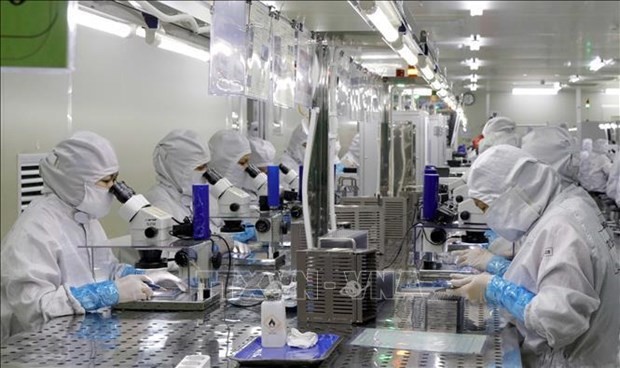 |
| Illustrative photo (Photo: VNA) |
According to the report, anticipated increases in electricity tariff and public sector salary in the coming months and easing of monetary policy by the State Bank of Vietnam (SBV) may lead to renewed upward pressure on inflation. Potential further financial tightening in the US to control inflation could create exchange rate pressures, especially as the SBV just reduced some policy interest rates to support the economy.
Close supervision of the financial sector is critical given continued uncertainties in global financial markets and a slowing domestic economy, including a sluggish real estate sector that constitutes about 20% of financial sector borrowing.
The bank reckoned that Vietnam’s economy registered low growth in Q1/2023 with only 3.3%, down from 5.9% in Q4/2022. This registers the second lowest Q1 growth rate in the past decade. This is mainly due to the contraction of the industry and the sharp drop in exports.
The low growth rate was largely due to the contraction of industry with recorded at -0.4% in Q1/2023, compared to an average of 5.3 % during 2020-2022 and weighed on growth -0.1 percentage point contribution to the GDP. The slowdown in industry mirrors the 11.8% contraction in exports.
In Q1/2023, the services sector grew by 6.8% and contributed 2.9 percentage point to the GDP. Agriculture registered a 2.5% growth rate - and contributed 0.3 percentage point to the GDP growth rate in Q1/2023.
Both exports and imports contracted by 11.8% and 14.6%, respectively, in Q1/2023, the second consecutive quarter of contraction in merchandise trade. The contraction in exports was largely due to two groups of products – computers, phones, electronics, and machinery, and their associated imported inputs.
Retail sales continued to boast a strong performance with an increase of 1.9% in Q1/2023 and 13.4% in March 2003. This was the 13th consecutive month in which retail sales recorded year-on-year double digit expansion.
Sales of services recorded vigorous growth in March 2023, with the sales of accommodation and catering increasing by 25.5% and sales of travel services increasing by 113.9%. The number of international visitors increased reached 2.7 million compared to 91,000 in Q1/2022.
Following an upward trend between March 2022 and January 2023, both headline and core inflation slowed down in February and March 2023.
Consumer Price Index (CPI) growth rate decelerated from 4.9 % (y/y) in January to 4.3% (y/y) in February to 3.4% (y/y) in March 2023.
Inflation was driven by higher prices of food and foodstuffs as well as housing and construction materials with the contributions to CPI of 1.3 percentage points and 1.2 percentage points, respectively. The price of transportation services decreased by 4.9% (y/y) in March 2023, helping to reduce the CPI inflation rate by 0.5 percentage point.
During the period, credit growth decelerated to 9.5% (y/y) in 2022, the lowest level since 2020, reflecting a slowdown in economic activity, especially in the industrial and real estate sectors.
In order to support the economy, the SBV reduced the operating interest rate twice in March, leading to a reduction in deposit and lending rates of commercial banks./.


















































